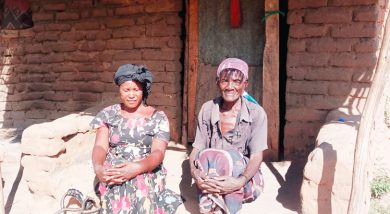Bridging communities to social services
M
alita Chikwita, 22, of Funachina Village, Traditional Authority Kalumbu in Lilongwe District, named her firstborn son Kamizere having given birth between ridges in a maize field.
“Picked on a kabaza bicycle at night during a thunderstorm, the woman in labour pains couldn’t cross Mlinda River which had swelled, flooding Mtenthera Health Centre, about five kilometres away,” she recalls.
Chikwita recalls being assisted by women escorting her to the health facility.
“I delivered the baby in a maize field as men gazed from a distance,” she narrates.
The woman says she is traumatised by the lack of privacy and “doesn’t want to have another child soon”.
“My privacy and dignity were violated. The bitter memories come to mind every time I cross the river going to the market,” she says.

Lilongwe District Council has constructed a K24 million bridge across the Mlinda River under the Governance for Enabled Service Delivery (Gesd). The Government of Malawi implements the performance-based initiative with funding from the World Bank through the National Local Government Finance Committee.
This excites Chikwita and her rural community which once struggled to cross the flood-prone river, especially during the rainy season.
“I will rename my son Chimwemwe to show my joy and appreciation,” she says.
Before bridging the waterway, children stopped going to school during the rainy season.
“We lost two learners while crossing the river on their way to school. Their bodies are still missing,” says Mataka II Primary School headteacher Chris Chawanda, thanking the government for constructing the bridge.
He says there is a marked decline in the number of children who skip classes during the rainy season.
“Parents no longer fear losing their children,: he says.
Group village head Funachina is pleased that access to education and healthcare is improving.
“Poor road network affected all aspects of our lives,” he says. “Now people in this part of Senior Chief Kalumbu’s territory easily cross the river to get vital services at Nkhoma and Kamphata.”
The traditional leader says the bridge will help his community enjoy their innate rights and reap the benefits of farming.
“As farmers, many sell their produce at Kamphata Market, but now we can go as far as Nkhoma. I believe access to better markets, than selling our harvests to vendors who reap us off, will transform our livelihoods,” he says.
Ward councillor Davison Mangani says the new bridge is a lifeline for access to basic needs, schools, hospitals, agricultural markets and cross-border trade with Mozambique.
“This is a prayer answered,” he says. “Many couldn’t believe their ears when the bridge construction project was announced during an area development committee (ADC) meeting. Its completion opens the gates for more community development activities.”
However, Mangani asks the government to construct another bridge on the Diaphwi River, where people risk drowning as they use crowded dugout canoes to cross over to neighbouring Dedza District and Mozambique.
He says: “Bridging Diaphwi River will boost cross-border trade between Malawi and Mozambique.
“Currently, the neglected earth road is a transit route for smugglers who evade tax for their goods.
“We’ve lost a lot of people on that river. Their bodies are rarely recovered.”
Motorcyclist Noel Maseko, who carries travellers at a fee across the new bridge, says it has boosted his business.
“These days, we no longer ask customers to cross disembark and walk to the other side. That was a waste of time,” he states.
Maseko says these days motorcycle taxis, called kabaza, make more trips per day, generating more than twice their past daily earnings.
Lilongwe District Council has approved new Gesd and District Development Fund projects for the 2024/2025 financial year.
Lilongwe District Council vice-chairperson Dominic Banda says the local government will prioritise 11 constituencies that did not benefit from previous funding.
Banda urged citizens, members of Parliament, councillors and community leaders to keep an eye of the projects for quality outcomes and prudent spending.
“Once the projects start, they will never stop and we will honour the due dates because the funds are readily available,” he says.





